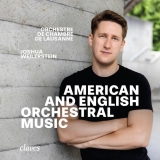Von Amerika zurück nach England oder, wie die ehemalige Kolonie sich auch musikalisch vom früheren Empire emanzipiert hat und ihm doch verbunden bleibt. So könnte man die Idee hinter diesem neuen Album des Orchestre de Chambre de Lausanne (OCL) zusammenfassen. Es zeigt eigene Entwicklungen und Gemeinsamkeiten in der Musik, die auch über den großen Teich hinaus Bestand haben. Eigene Entwicklungen etwa bei Charles Ives, dem kompositorischen Freischärler, den Joshua Weilerstein und das OCL erst gar nicht versuchen einzufangen, zu bändigen, sondern seinen Three Places in New England die nötige Struktur und viele Klangfarben verleihen, die unterstreichen, dass Ives kein willkürlicher Chaot war. Mystisch und schattenhaft erklingt der erste Satz, streng rhythmisch und mit einem Schuss Sarkasmus die polyrhythmisch komplexe Marschparodie und erhaben, innig der abschließende Choral.
Mit Ives’ Zeitgenossin Ethel Smyth tauchen wir in die Welt der Spätromantik ein. Auch hier finden Joshua Weilerstein und das OCL den passenden Zugang, geben der Suite für Streicher klassische Leichtigkeit, Verspieltheit und Anmut in stets hell und zart schimmerndem Orchesterklang. Besonders hinreißend gelingt das Adagio. Erfrischend schwungvoll mit schöner klanglicher Brillanz erklingt die Serenade der englischen Komponistin.
Mother and Child – der Titel von William Grant Stills kurzem Werk, schafft Erwartungen, die nicht enttäuscht werden. Wir hören ein Orchester, das mit viel Sensibilität und zarten Emotionen spielt.
Stilvielfalt ist bei Caroline Shaws Entracte angesagt, das sich um ein kurzes Haydn-Motiv dreht. Das Orchester de Chambre de Lausanne macht daraus ein feines Mosaik unterschiedlichster Klangwelten, die es mit viel Raffinesse zu einer Einheit formt.
Edward Elgar darf in diesem Tableau natürlich nicht fehlen und ist zum Abschluss mit schön poetisch ausgesungenen Two Pieces zu hören.
From America back to England, or how the former colony has emancipated itself musically from the former Empire and yet remains connected to it. This is how one could summarize the idea behind this new album by the Orchestre de Chambre de Lausanne (OCL). It shows individual developments and similarities in the music that have endured across the Atlantic Ocean. For example, Charles Ives’s own developments, the compositional free-booter, whom Joshua Weilerstein and the OCL do not even attempt to capture or tame, but instead give his Three Places in New England the necessary structure and many tonal colors that underline the fact that Ives was no random chaos. The first movement sounds mystical and shadowy, the polyrhythmically complex march parody strictly rhythmic and with a dash of sarcasm and the concluding chorale sublime and intimate.
Ives’ contemporary Ethel Smyth immerses us in the world of late Romanticism. Here too, Joshua Weilerstein and the OCL find the right approach, giving the Suite for Strings a classical lightness, playfulness and grace in a consistently bright and delicately shimmering orchestral sound. The Adagio is particularly captivating. The English composer’s Serenade is refreshingly lively with beautiful tonal brilliance.
Mother and Child – the title of William Grant Still’s short work – creates expectations that are not disappointed. We hear an orchestra that plays with great sensitivity and delicate emotions.
A variety of styles is the order of the day in Caroline Shaw’s Entracte, which revolves around a short Haydn motif. The Orchester de Chambre de Lausanne turns it into a fine mosaic of the most diverse sound worlds, which it forms into a unity with great finesse.
Of course, Edward Elgar should not be missing from this tableau and can be heard at the end with the beautifully poetic Two Pieces.






















